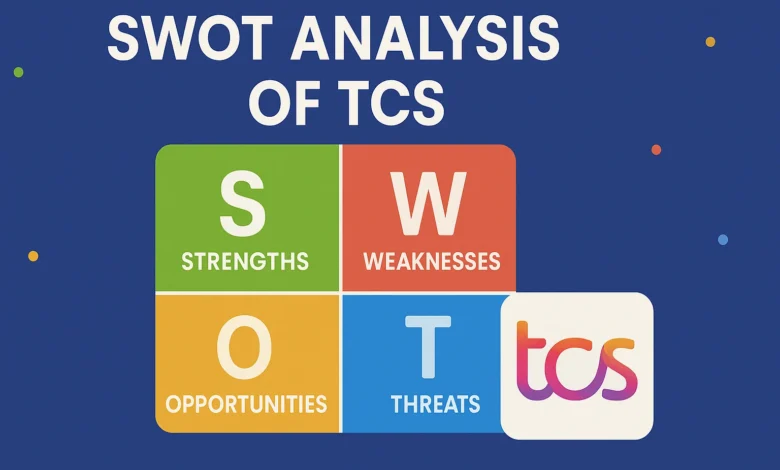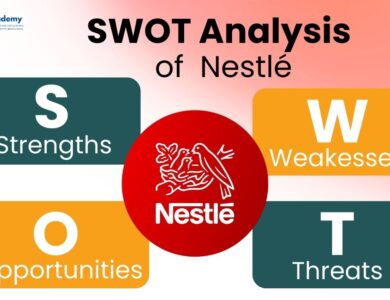SWOT Analysis of TCS: Inside India’s Global IT Powerhouse
Explore the complete SWOT analysis of TCS in 2025. Discover the strengths, weaknesses, opportunities, and threats shaping the future of one of India’s largest and most respected IT services companies.

When you think of Indian IT success stories, TCS (Tata Consultancy Services) is usually the first name that comes to mind. From humble beginnings to becoming a global technology powerhouse, TCS has played a key role in putting India on the world’s digital map.
As of 2025, TCS isn’t just competing with Indian players—it’s going head-to-head with global giants like Accenture, IBM, and Capgemini. It delivers services in everything from cloud transformation to AI-driven automation and cybersecurity.
But how strong is TCS really? And what challenges does it face as the world rapidly shifts toward AI, remote work, and platform-based models?
In this blog, we’ll dive deep into a complete SWOT analysis of TCS—looking at its Strengths, Weaknesses, Opportunities, and Threats in the current landscape. Whether you’re a student, job seeker, investor, or industry analyst, this breakdown will give you real insight into what makes TCS tick.
Let’s begin with a quick overview of the company itself.
Also read: Complete SWOT Analysis of Jio – A Deep Dive into India’s Telecom Disruptor
Learn AI & Digital Marketing,
Pay Fees After Placement
- ✅ Minimal Admission Fees
- ✅ No Loan or Income Sharing Agreement
- ✅ 100% Placement Support
- ✅ ISO & Govt Registered Certificate
- ✅ Practical 3+1 Months Duration
Get a free counseling call. We’ll guide you through learning, certification, and job placement.
Request a Free Call Back
Takes less than a minute.
Company Overview of TCS
Tata Consultancy Services (TCS) was founded in 1968 and is a part of the globally respected Tata Group. Headquartered in Mumbai, TCS has grown into India’s largest IT services company and one of the top global players in the tech consulting space.
As of 2025:
-
Revenue: Over ₹2.4 lakh crore (~$29 billion USD)
-
Employees: 620,000+ across 55+ countries
-
Clients: Serving 1,000+ clients, including 200+ Fortune 500 companies
-
Service Areas: Cloud computing, cybersecurity, data analytics, artificial intelligence, enterprise application services, and business consulting
TCS has built its reputation on stability, delivery excellence, and long-term partnerships, especially in sectors like banking, insurance, retail, and manufacturing.
Today, it’s not just about outsourcing—TCS is helping clients transform digitally, compete globally, and innovate faster.
What is a SWOT Analysis?
A SWOT analysis is a strategic tool used to evaluate a company’s current position in the market by analyzing four key factors:
-
Strengths – What the company does well
-
Weaknesses – Internal challenges or limitations
-
Opportunities – External trends or gaps it can capitalize on
-
Threats – External risks that could impact its performance
For a technology and consulting giant like TCS, a SWOT analysis helps us understand how it’s navigating the fast-changing IT landscape, where AI, automation, cloud services, and talent mobility are redefining success.
Whether you’re evaluating TCS for a job, investment, case study, or competitor research—this analysis will offer a clear, balanced view of where it stands in 2025.
Also read: Complete SWOT Analysis of Jio – A Deep Dive into India’s Telecom Disruptor
Strengths of TCS
TCS has become a benchmark for excellence in India’s IT industry—and a trusted partner for some of the biggest brands in the world. Its strengths are deeply rooted in scale, consistency, and strategic execution.
Let’s explore what gives TCS its edge in 2025:
1. Strong Global Brand & Tata Legacy
TCS benefits immensely from being part of the Tata Group, one of India’s most respected business houses. The trust, credibility, and global recognition of the Tata brand help TCS win clients across geographies.
For many global businesses, working with a Tata brand means long-term commitment and reliability.
2. Diverse and Loyal Client Base
TCS serves over 1,000 clients globally, with many relationships spanning 10+ years. Its client portfolio includes Fortune 500 companies across BFSI, retail, healthcare, manufacturing, and telecom.
This diversification helps cushion against sector-specific downturns.
3. Operational Scale and Delivery Excellence
With over 620,000 employees and presence in 55+ countries, TCS has one of the largest delivery capabilities in the IT world.
Its Global Network Delivery Model™ (GNDM) ensures seamless service across time zones, while maintaining cost efficiency and quality.
4. Consistent Financial Performance
TCS has a track record of steady revenue growth, high operating margins (~24%), and strong dividend payouts. Even in times of global uncertainty, TCS maintains debt-free operations and stable cash flows.
Investors see TCS as a safe and profitable long-term bet.
5. Focus on Emerging Technologies
TCS has ramped up offerings in cloud transformation, AI, machine learning, analytics, and cybersecurity. It’s not just about outsourcing anymore—TCS is helping enterprises reimagine how they work, deliver, and innovate.
Competitor Comparison Table
| Company | FY25 Revenue (USD) | Employees | Operating Margin | Global Clients | Market Cap (USD) |
|---|---|---|---|---|---|
| TCS | $29B+ | 620,000+ | ~24% | 1,000+ | $140B+ |
| Infosys | $19B+ | 345,000+ | ~21% | 800+ | $77B+ |
| Accenture | $66B+ | 740,000+ | ~15% | 9,000+ | $220B+ |
| Wipro | $11B+ | 240,000+ | ~15% | 600+ | $30B+ |
Note: Figures are approximate and based on FY24–25 reports and stock market data.
With a powerful mix of legacy, leadership, and global delivery, TCS continues to dominate the Indian IT services space—and competes confidently on a global stage.
Weaknesses of TCS
While TCS is a dominant player in IT services, it’s not without its limitations. Some of these internal weaknesses could slow down growth or affect its ability to innovate quickly in today’s tech-driven world.
Let’s break down the key areas where TCS faces challenges:
1. Overdependence on BFSI and North America
A significant portion of TCS’s revenue comes from the Banking, Financial Services & Insurance (BFSI) sector and North American markets. Any downturn in these segments could impact revenues disproportionately.
Diversification across geographies and industries is improving—but the risk still remains.
2. Limited Product Innovation
TCS is primarily a service-based company. Unlike players such as Microsoft or Oracle, it lacks a strong IP or product portfolio. This can limit margins and scalability in fast-growing SaaS and platform markets.
3. Slower Adoption of Emerging Technologies
Although TCS is investing in AI, blockchain, and automation, critics argue it’s not as agile as younger tech firms or specialized consultancies.
Legacy systems, layered hierarchies, and a risk-averse culture may slow down rapid innovation.
4. Bureaucratic Structure and Slow Decision-Making
As a massive organization, decision-making at TCS can be hierarchical and process-heavy. This sometimes affects its ability to pivot quickly in high-speed digital transformations or during client crises.
5. Talent Retention in High-Skill Roles
TCS is known for its strong entry-level hiring, but it faces challenges in retaining niche talent—especially in areas like AI/ML, product management, and data science, where startups and global tech firms offer more attractive pay and culture.
While these weaknesses don’t shake TCS’s foundation, they are important to address for long-term agility, innovation, and growth.
Opportunities for TCS
In the ever-evolving tech space, TCS is well-positioned to capture major global growth trends. With the right investments and strategy, the company can expand its reach, deepen its capabilities, and lead the next wave of digital transformation.
Let’s explore the most promising opportunities for TCS in 2025 and beyond:
1. Global Demand for Cloud, AI, and Cybersecurity
Enterprises across sectors are rapidly adopting cloud infrastructure, AI solutions, and cybersecurity frameworks. TCS can deepen partnerships with hyperscalers like AWS, Microsoft Azure, and Google Cloud to offer full-stack transformation services.
Its ignio™ AI platform and cybersecurity services are gaining traction and can become major revenue drivers in this space.
2. Growth in Emerging Markets
Markets in Africa, Latin America, Southeast Asia, and even Tier-2/3 Indian cities are increasing their IT and digital investments.
TCS can tap into these geographies by offering localized, cost-effective IT solutions and expanding its delivery presence.
3. Public Sector and Government Digitization
As governments push for smart governance, public infrastructure digitalization, and citizen service platforms, TCS can play a strategic role in India and abroad.
It already handles several projects like passport services, income tax filing portals, and is well-suited to expand further in this domain.
4. Strategic Acquisitions and Product Development
TCS can accelerate growth by acquiring niche SaaS or AI startups, especially in healthcare, retail tech, and ESG analytics. It also has room to launch industry-specific platforms to shift from pure services to platform-as-a-service models.
5. Remote Work and Hybrid Delivery Models
The post-COVID work culture has opened doors for borderless talent acquisition and flexible client delivery. TCS can scale hybrid consulting models and tap into gig-tech workforces, improving both talent access and cost efficiency.
These opportunities offer a chance for TCS to go beyond traditional outsourcing and become a true digital innovation partner across industries and regions.
Threats to TCS
Despite its strong market presence, TCS faces several external risks that could impact growth, profitability, and global positioning. As the IT services landscape grows more competitive and complex, these threats are becoming more real—and urgent.
Let’s look at the key challenges TCS must navigate:
1. Rising Global Competition
TCS competes with Accenture, IBM, Infosys, Wipro, Cognizant, and several specialized cloud and AI consultancies. Many of these rivals are investing aggressively in next-gen tech, pushing innovation cycles faster.
Keeping pace without diluting service quality or margins is a constant challenge.
2. Regulatory Risks & Data Localization Laws
Data privacy and localization laws are becoming stricter in regions like Europe, the U.S., and India. These require firms to store and process data locally, often increasing infrastructure and compliance costs for service providers like TCS.
3. Currency Fluctuations and Global Economic Uncertainty
TCS earns a large share of its revenue in USD and EUR. Economic slowdown, inflation, or foreign exchange volatility can negatively affect profit margins.
Uncertainty in client geographies—especially in BFSI—can delay decision-making and cut IT budgets.
4. Attrition & Talent Shortage in Niche Areas
Even though TCS maintains low attrition compared to peers, there’s a growing shortage of high-end skills in AI, data science, and cloud architecture.
Startups and global product firms often offer more competitive packages, posing a threat to retaining top talent.
5. Automation & AI Disruption
Ironically, the very technologies TCS helps implement—like AI and RPA (Robotic Process Automation)—could eventually reduce the demand for large-scale human outsourcing models.
This could affect long-term revenue from traditional IT support and BPO services.
While TCS has the scale and strategy to counter many of these threats, agility and forward-looking innovation will be key to long-term resilience.
Strategic Insights & Key Takeaways
TCS is not just India’s biggest IT firm—it’s one of the most trusted digital partners in the world. But in a time where technology evolves overnight, scale alone isn’t enough.
Here’s what the SWOT analysis tells us about TCS in 2025:
-
Its strengths—a powerful global brand, consistent delivery, and client trust—make it a top player in IT services.
-
However, its reliance on BFSI and service-based revenues could limit agility, especially as the world moves toward product and platform models.
-
There are big growth opportunities in AI, cybersecurity, cloud, and emerging markets—if TCS invests boldly and acquires strategically.
-
At the same time, threats like rising competition, attrition, and automation require it to rethink its delivery models and stay innovation-first.
To lead the next decade, TCS must evolve from a service giant to a tech innovator, balancing cost efficiency with cutting-edge value delivery.
Conclusion
TCS has built a legacy of trust, performance, and global excellence. From powering banking systems in Europe to running public infrastructure in India, it’s proven its ability to deliver at scale—without compromising on quality.
But as we move deeper into the AI and cloud era, TCS must keep reinventing itself. Innovation, speed, and specialization will matter more than ever. The company has the right foundation, talent pool, and leadership—now it needs bold moves to stay ahead.
This SWOT analysis of TCS shows that while it remains a tech titan, its future will depend on how quickly it embraces new technologies, expands into emerging sectors, and builds products—not just services.
FAQs – SWOT Analysis of TCS
1. What is TCS best known for?
TCS is known for its large-scale IT services, digital transformation consulting, and being part of the Tata Group. It serves Fortune 500 clients across industries like banking, retail, telecom, and healthcare.
2. What are the growth opportunities for TCS in 2025?
TCS can grow by expanding in cloud, AI, cybersecurity, and government digital projects. Emerging markets and mid-size businesses also present untapped potential.
3. What are the biggest threats to TCS?
TCS faces strong competition from global firms like Accenture, risks from automation, talent shortages in high-skill areas, and increasing regulatory pressures on data privacy and localization.
4. How does TCS compare to Infosys and Accenture?
TCS leads in scale, margins, and brand trust. Infosys is catching up with faster innovation, while Accenture holds the edge in consulting and global product partnerships.





